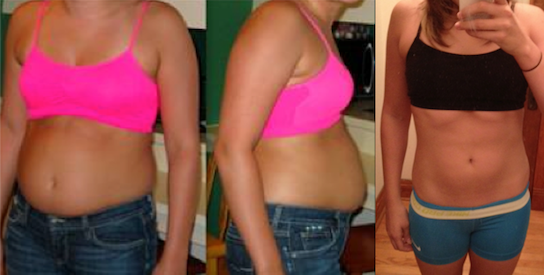Muscle weighs more than fat

SooZ1138
Posts: 65 Member
Hi there! So I started this program a week ago and have been EXTRA vigilant in making sure to keep my calories at my mark and have a new found love of working out. I do a pilates class one day a week, Zumba one day a week, run 3 days a week and strength train for 2 days out of the week (obviously some of these overlap each other). My question is, is it normal to gain muscle during this process and not see a huge difference in your weight each week because of this?
0
Replies
-
It's my understanding that you don't gain muscle that fast. More likely it's water retention from your muscles healing themselves.0
-
Most women would not be able to gain a pound of muscle in one month, but when you exercise your muscles hold onto water, and that might mask actual fat loss.
I know a lot of people will jump on this and point out that muscle does not weigh more than fat, but it is more dense and takes up less room on your body.0 -
You will be ripped on here for saying muscle weighs more than fat. A pound is a pound. Muscle is more dense so you can appear smaller but weigh more. I would suspect water retention in your muscles as they repair themselves - it is normal and will even out.0
-
*headdesk headdesk*0
-
No...a pound is a pound, be it muscle or fat. You have a very active workout regime . Your body requires the calories you eat to do what you do. You may not get a loss on the scale, but I am sure you are seeing great results with the re- shaping of your body. It sounds like you are doing things right. :drinker: Keep up the good work !0
-
Muscle does not weigh more than fat. 1 lb of muscle = 1 lb of fat. Weight is just simply your mass times gravity. Which brings up the concept of density. Density is simply mass per a unit of volume. Now, it is correct to say muscle is more dense than fat; hence, why 1 lb of muscle is so much smaller than 1 lb of fat.0
-
You will be ripped on here for saying muscle weighs more than fat. A pound is a pound. Muscle is more dense so you can appear smaller but weigh more. I would suspect water retention in your muscles as they repair themselves - it is normal and will even out.
she never said a pound of muscle weighs more than a pound of fat. When someone says muscle weighs more than fat they imply by volume, since it is implied it does not need to be stated and is therefore correct.
FYI: because of gravity on earth the more dense something is the more it will weight, assuming equal volumes.
That being said, most likely water retention in the muscles to protect them from the damaged caused by exercise. Once you get us to the workouts your muscles will shed most of the water.0 -
What he said, but also be careful on MFP. Sometimes you get ripped to shreads for typing things incorrectly. Just note, 1lb is equal to 1lb. The correct wording of this would be Muscle is more dense the fat. So although you may loose some inches putting on muscle and losing fat, you may actually weigh more.
But yes, this is probably due to water, and slight muscle gains. I don't like to use the scale too much as reference. Use the mirror or tape measure.It's my understanding that you don't gain muscle that fast. More likely it's water retention from your muscles healing themselves.0 -
Muscle does NOT weigh more than fat. A pound is a pound is a pound.
However...
Muscle is more dense than fat and therefore 5 pounds of muscle takes up a smaller amount of space than 5 pounds of fat. This is why it is suggested that you also measure to check progress. You may be losing fat, gaining muscle and the scale won't move... sometimes it may even go up. 0
0 -
Muscle does NOT weigh more than fat. A pound is a pound is a pound.
However...
Muscle is more dense than fat and therefore 5 pounds of muscle takes up a smaller amount of space than 5 pounds of fat. This is why it is suggested that you also measure to check progress. You may be losing fat, gaining muscle and the scale won't move... sometimes it may even go up.
Now take your picture and make the muscle and fat the same size (volume) which would weigh more? Muscle of course so she is correct in saying muscle weighs more as you should keep volume constant when comparing weights of 2 matters.0 -
Now that the "muscle weighs more than fat" argument is taken care of ....
I wouldn't expect huge differences in weight week to week. So many factors go into what the scale says daily. You could of just ate a bigger meal then you did the last time you weighed yourself. You could be holding water. You could have issues with Tom. So much can effect a scale that while you could have had an excellent week in terms of the amount of fat burnt that it doesn't actually show on the scale.0 -
Seriously, the way people rip on each other instead of helping can cause someone to get discouraged before even starting.0
-
To be honest doesn't weight imply mass? It doesn't directly correlate to volume until density is taken into consideration. So it technically is not implied. He was just doing what I was trying to do myself. Give the OP a fair warning before others start to rip on this.You will be ripped on here for saying muscle weighs more than fat. A pound is a pound. Muscle is more dense so you can appear smaller but weigh more. I would suspect water retention in your muscles as they repair themselves - it is normal and will even out.
she never said a pound of muscle weighs more than a pound of fat. When someone says muscle weighs more than fat they imply by volume, since it is implied it does not need to be stated and is therefore correct.
FYI: because of gravity on earth the more dense something is the more it will weight, assuming equal volumes.
That being said, most likely water retention in the muscles to protect them from the damaged caused by exercise. Once you get us to the workouts your muscles will shed most of the water.0 -
Almost impossible to gain any muscle on calorie deficit. The weight is from glycogen and water storage in the muscle from exercise. Usually subsides in a couple of weeks.Hi there! So I started this program a week ago and have been EXTRA vigilant in making sure to keep my calories at my mark and have a new found love of working out. I do a pilates class one day a week, Zumba one day a week, run 3 days a week and strength train for 2 days out of the week (obviously some of these overlap each other). My question is, is it normal to gain muscle during this process and not see a huge difference in your weight each week because of this?
A.C.E. Certified Personal Trainer
IDEA Fitness member
Kickboxing Certified Instructor
Been in fitness for 28+ years and have studied kinesiology and nutrition0 -
Seriously, the way people rip on each other instead of helping can cause someone to get discouraged before even starting.
for real... yall knew what she meant...i hate that argument. it's pointless.
as for the OP, I agree with whoever said water retention. Your muscles tend to hold in water when they heal. I always weigh more the morning after i lift compared to a morning after a lot of cardio. it'll all even back out0 -
The title said muscle weighs more than fat. I was trying to intervene before people started being jerks about it.You will be ripped on here for saying muscle weighs more than fat. A pound is a pound. Muscle is more dense so you can appear smaller but weigh more. I would suspect water retention in your muscles as they repair themselves - it is normal and will even out.
she never said a pound of muscle weighs more than a pound of fat. When someone says muscle weighs more than fat they imply by volume, since it is implied it does not need to be stated and is therefore correct.
FYI: because of gravity on earth the more dense something is the more it will weight, assuming equal volumes.
That being said, most likely water retention in the muscles to protect them from the damaged caused by exercise. Once you get us to the workouts your muscles will shed most of the water.0 -
It seems everyone has addressed the more dense issue. (I think this is what most people mean when they say 'weighs more.' Of course a pound is a pound, I think it's the just wording that gets jumbled. Let's be nice. It's one thing to politely correct semantics, but another to tear into someone. Harping on this isn't helping to answer her question.) Anyhow....
I agree that it's most likely your muscles retaining water to repair the micro tears that exercising causes. However, over a longer period of time, you can certainly gain weight and lose inches.
The photo below shows me at 150lbs in June of 2010 on the left, and me at 150lbs in November 2011. (In between these two photos, I did lose quite a bit of weight and got thinner, and then since I started strength training this summer, have gained weight back.)
From a Nerd Fitness article, look at Staci. She weighs 131lbs on the left and 142lbs on the right:
(source: http://nerdfitness.com/blog/2011/07/21/meet-staci-your-new-powerlifting-super-hero/)
However, this does take a bit of time, and isn't going to happen in a week. I just wanted to share so you had some images to see when you start thinking long term.0 -
Muscle does NOT weigh more than fat. A pound is a pound is a pound.
FACEPALM!
Muscle is denser than fat. Therefore a given volume of muscle weighs much more than a comparabe volume of fat. Saying muscle weighs the same as fat is EXACTLY ANALAGOUS TO SAYING "GOLD WEIGHS THE SAME AS WOOD BECAUSE A POUND OF GOLD EQUALS A POUND OF WOOD." Basically it's a very strange thing to say.0 -
unless someone says 1lb of [whatever] weighs the same as 1lb of [other substance], you can't really assume that that's what they're saying.
You know what you can assume, though? That when someone says muscle weighs more than fat, they're implying "by volume."0 -
It seems everyone has addressed the more dense issue. (I think this is what most people mean when they say 'weighs more.' Of course a pound is a pound, I think it's the just wording that gets jumbled. Let's be nice. It's one thing to politely correct semantics, but another to tear into someone. Harping on this isn't helping to answer her question.) Anyhow....
I agree that it's most likely your muscles retaining water to repair the micro tears that exercising causes. However, over a longer period of time, you can certainly gain weight and lose inches.
The photo below shows me at 150lbs in June of 2010 on the left, and me at 150lbs in November 2011. (In between these two photos, I did lose quite a bit of weight and got thinner, and then since I started strength training this summer, have gained weight back.)
From a Nerd Fitness article, look at Staci. She weighs 131lbs on the left and 142lbs on the right:
(source: http://nerdfitness.com/blog/2011/07/21/meet-staci-your-new-powerlifting-super-hero/)
However, this does take a bit of time, and isn't going to happen in a week. I just wanted to share so you had some images to see when you start thinking long term.
Winner. Great post, I for one am quite impressed and found this helpful.0 -
all debates about muscle vs. fat aside, you have a great work out schedule, and im excited to hear about your progress. Best of luck!0
-
It seems everyone has addressed the more dense issue. (I think this is what most people mean when they say 'weighs more.' Of course a pound is a pound, I think it's the just wording that gets jumbled. Let's be nice. It's one thing to politely correct semantics, but another to tear into someone. Harping on this isn't helping to answer her question.) Anyhow....
I agree that it's most likely your muscles retaining water to repair the micro tears that exercising causes. However, over a longer period of time, you can certainly gain weight and lose inches.
The photo below shows me at 150lbs in June of 2010 on the left, and me at 150lbs in November 2011. (In between these two photos, I did lose quite a bit of weight and got thinner, and then since I started strength training this summer, have gained weight back.)
From a Nerd Fitness article, look at Staci. She weighs 131lbs on the left and 142lbs on the right:
(source: http://nerdfitness.com/blog/2011/07/21/meet-staci-your-new-powerlifting-super-hero/)
However, this does take a bit of time, and isn't going to happen in a week. I just wanted to share so you had some images to see when you start thinking long term.
This was great! Thanks for the visual!
I get it now... I'm new to all of this, I have NEVER really paid any attention to my body, the way I eat, or the scale. I heard years ago from someone that she weighed more when she got fit than when she first was trying to lose weight. This all makes it pretty clear. Thank you for those with CONSTRUCTIVE responses... those who try to make people feel stupid for being ignorant are pretty rude. That's okay, I'm not on here to change people.... just looking for information. Thanks!0 -
This is such a timeless topic where you'll get both sides of the arguement giving their thoughts - both are valid of course from the perspective of how they interpret the fat vs. muscle stance, but I think you always have to consider how this ultimately affects YOU - forget everything else because at the end of the day, it's all about you.
If it helps any - my experience has been more straightforward. Since i've joined MFP, i've lost over 30 lbs and have only gone over my daily caloric intake maybe 4 or 5 times (and according to the site, i've logged in for 210 days in a row). At one point, I weighed about 153 lbs (down from 189 when I first joined). For the past 5 weeks or so, i've increased my exercise regimen and added several elements of strength training which ultimately caused my muscles to retain water. I gained 5 lbs in the process, but I am seeing some noticeable changes in my body's shape.
So again, just be careful with how you take this information as the only thing that really matters is how this will help you in the end.0 -
Nope. You need to be in calorie surplus to gain muscle.Hi there! So I started this program a week ago and have been EXTRA vigilant in making sure to keep my calories at my mark and have a new found love of working out. I do a pilates class one day a week, Zumba one day a week, run 3 days a week and strength train for 2 days out of the week (obviously some of these overlap each other). My question is, is it normal to gain muscle during this process and not see a huge difference in your weight each week because of this?
A.C.E. Certified Personal Trainer
IDEA Fitness member
Kickboxing Certified Instructor
Been in fitness for 28+ years and have studied kinesiology and nutrition0
This discussion has been closed.
Categories
- All Categories
- 1.4M Health, Wellness and Goals
- 398.4K Introduce Yourself
- 44.7K Getting Started
- 261K Health and Weight Loss
- 176.4K Food and Nutrition
- 47.7K Recipes
- 233K Fitness and Exercise
- 462 Sleep, Mindfulness and Overall Wellness
- 6.5K Goal: Maintaining Weight
- 8.7K Goal: Gaining Weight and Body Building
- 153.5K Motivation and Support
- 8.4K Challenges
- 1.4K Debate Club
- 96.5K Chit-Chat
- 2.6K Fun and Games
- 4.8K MyFitnessPal Information
- 17 News and Announcements
- 21 MyFitnessPal Academy
- 1.5K Feature Suggestions and Ideas
- 3.2K MyFitnessPal Tech Support Questions













